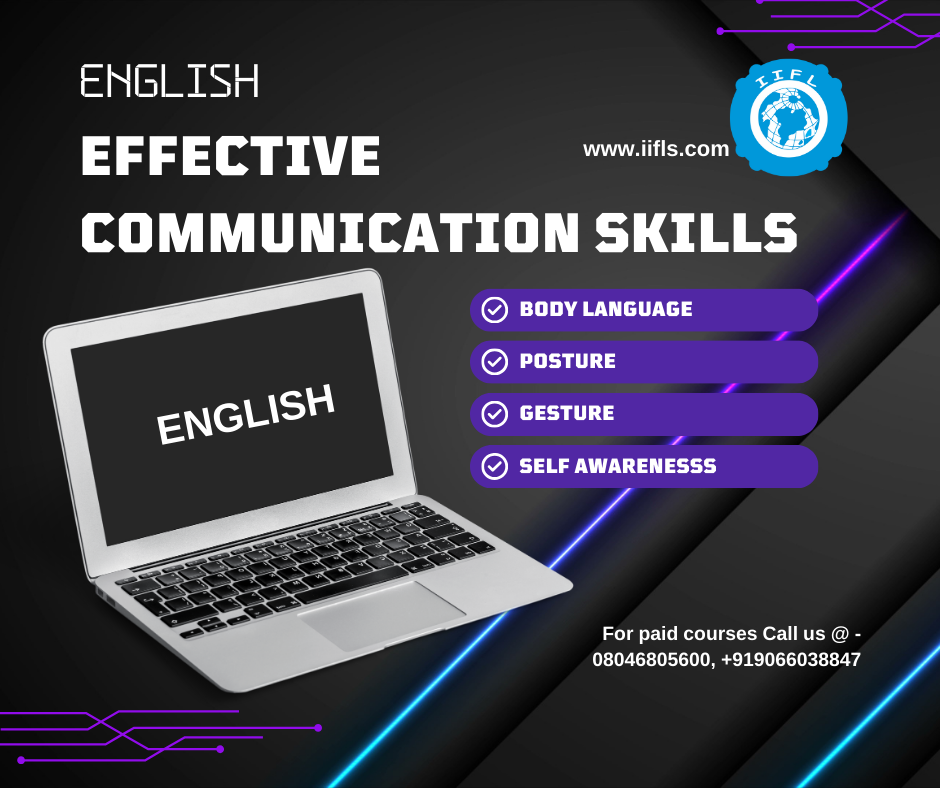English for beginners | Communication skills | verbal | body language | stage appearance |
Click here to join upcoming free webinars
English for beginners:- Topics included
What Are Effective Presentation Skills?
1. Verbal communication
2. Body language
3. Voice projection
4. Posture
5. Storytelling
6. Active listening
7. Stage presence
8. Self-awareness.
For more English beginner courses follow our updates
Learn English for beginners
@ https://iifls.com/learn-english-for-free/
Call us for a DEMO class: 080 46805600, +91 9066038847
Effective communication skills in English
Effective communication skills in English are essential for personal and professional growth. Whether you’re a student, a job seeker, or a professional aiming to excel in your career, the ability to communicate effectively in English is a valuable asset. In this article, we’ll explore the key aspects of effective communication and provide 27 practical tips to help you become a more proficient English communicator.
Click here to learn more about spoken English classes at IIFLS.

Listing out some of the effective communication skills in English,
1. Understand Your Audience:
The first step to effective communication is to understand your audience. Tailor your language and message to their level of comprehension and interests.
2. Choose the Right Words:
Selecting the right words is crucial. Avoid jargon and use simple, clear language whenever possible.
3. Practice Active Listening:
Active listening is a fundamental skill. Give your full attention to the speaker, ask questions, and provide feedback to show you’re engaged.
4. Use Nonverbal Communication:
Nonverbal cues, such as facial expressions, body language, and gestures, complement your spoken words. Be aware of how you convey information nonverbally.
5. Maintain Eye Contact:
Maintaining eye contact during conversations conveys confidence and shows you are attentive.
6. Speak Clearly and Slowly:
Articulate your words clearly and speak slowly to ensure your message is easily understood.
7. Avoid Interruptions:
Respect others’ speech by avoiding interruptions. Wait for the appropriate moment to respond.
8. Body Language Matters:
Your body language matters as much as your words. Use open, welcoming postures and avoid crossing your arms, which can appear defensive.
9. Be Empathetic:
Empathy is key to understanding and responding to the feelings and concerns of others. It enhances your communication skills.
10. Ask Open-Ended Questions:
Engage in conversation by asking open-ended questions that encourage discussion.
11. Eliminate Distractions:
Eliminate distractions during important conversations to maintain focus.
12. Build a Strong Vocabulary:
Expanding your vocabulary will enable you to express your thoughts more precisely and articulately.
13. Practice Pronunciation:
Clear pronunciation is vital for effective communication. Practice challenging sounds to improve.
14. Enhance Your Grammar Skills:
Grammar skills play a crucial role in conveying your message accurately.
15. Structure Your Message:
Organize your thoughts logically and structure your message for clarity.
16. Use Visual Aids:
When appropriate, use visual aids to enhance understanding, especially in presentations.
17. Be Respectful:
Respect the opinions and beliefs of others, even when you disagree.
18. Avoid Negative Language:
Minimize the use of negative language and focus on constructive communication.
19. Be Mindful of Tone:
Pay attention to the tone of your voice, as it can affect the message’s interpretation.
20. Adapt to Different Situations:
Different situations may require varied communication approaches. Be adaptable.
21. Maintain Clarity in Writing:
Written communication also requires clarity and conciseness. Proofread to avoid misunderstandings.
22. Develop Interpersonal Skills:
Interpersonal skills are essential in building strong relationships through effective communication.
23. Seek Feedback:
Seek feedback from peers and mentors to continuously improve your communication skills.
24. Learn from Experts:
Learn from experts in effective communication to gain insights and strategies.
25. Master Public Speaking:
Public speaking skills are valuable in many aspects of life. Practice and refine them.
26. Join Discussion Groups:
Joining discussion groups or clubs can provide opportunities to practice and learn from others.
27. Be Patient:
Effective communication is a skill that requires patience and ongoing effort to master. Click here to access other free courses in English, Learn English for Free
Click here to learn more about Best business English classes in Bangalore.
In conclusion, effective communication skills in English are indispensable for success in a globalized world. By understanding your audience, improving your vocabulary, honing your pronunciation, and practicing empathy, you can become a proficient English communicator. Keep in mind that mastering these skills is a continuous journey that can open doors to new opportunities and enrich your personal and professional life.


